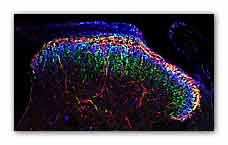|
This discovery has implications for how people
perceive hot and cold temperatures and for why
people with certain forms of chronic pain experience
heightened responses to cold temperatures.

Neural circuit that senses heat and itch is labeled
red. Neural circuits that process other sensory
stimuli are labeled in blue and green. Image is from
the spinal cord. Source: Zylka lab, UNC.
A study from the University of North Carolina School
of Medicine offers new insights into how the nervous
system processes hot and cold temperatures. The
research led by neuroscientist Mark J. Zylka, PhD,
associate professor of cell biology and physiology,
found an interaction between the neural circuits
that detect hot and cold stimuli: cold perception is
enhanced when nerve circuitry for heat is
inactivated.
“This discovery has implications for how we perceive
hot and cold temperatures and for why people with
certain forms of chronic pain, such as neuropathic
pain, or pain arising as direct consequence of a
nervous system injury or disease, experience
heightened responses to cold temperatures,” says
Zylka, a member of the UNC Neuroscience Center.
The study also has implications for why a promising
new class of pain relief drugs known as TRPV1
antagonists (they block a neuron receptor protein)
cause many patients to shiver and “feel cold” prior
to the onset of hyperthermia, an abnormally elevated
body temperature. Enhanced cold followed by
hyperthermia is a major side effect that has limited
the use of these drugs in patients with chronic pain
associated with multiple sclerosis, cancer, and
osteoarthritis.
This new study used cutting edge cell ablation
technology to delete the nerve circuit that encodes
heat and some forms of itch while preserving the
circuitry that sense cold temperatures.
This manipulation results in animals that were
practically “blind” to heat, meaning they could no
longer detect hot temperatures, Zylka explains.
“Just like removing heat from a room makes us feel
cold (such as with an air conditioner), removing the
circuit that animals use to sense heat made them
hypersensitive to cold. Physiological studies
indicated that these distinct circuits regulate one
another in the spinal cord.”
TRPV1 is a receptor for heat and is found in the
primary sensory nerve circuit that Zylka studied.
TRPV1 antagonists make patients temporarily blind to
heat, which Zylka speculates is analogous to what
happened when his lab deleted the animals’ circuit
that detects heat: cold hypersensitivity.
Zylka emphasizes that future studies will be needed
to confirm that TRPV1 antagonists affect cold
responses in a manner similar to what his lab found
with nerve circuit deletion.
The research was selected by the journal Neuron as
cover story for the April 10, 2013 print edition and
was available in the April 4, 2013 advanced online
edition.
The study was conducted in the Zylka lab by
postdoctoral scientists Eric S. McCoy, Sarah E.
Street, and Jihong Zheng and by research associates
Bonnie Taylor-Blake and Alaine Pribisco. Funding for
the research came from the Searle Scholars Program,
The Klingenstein Foundation, The Rita Allen
Foundation, the National Institute of Neurological
Disorders and Stroke (NINDS) and the National
Institute of Child Health and Human Development (NICHD).
For more information
http://www.unchealthcare.org
(MDN)
|
![]()